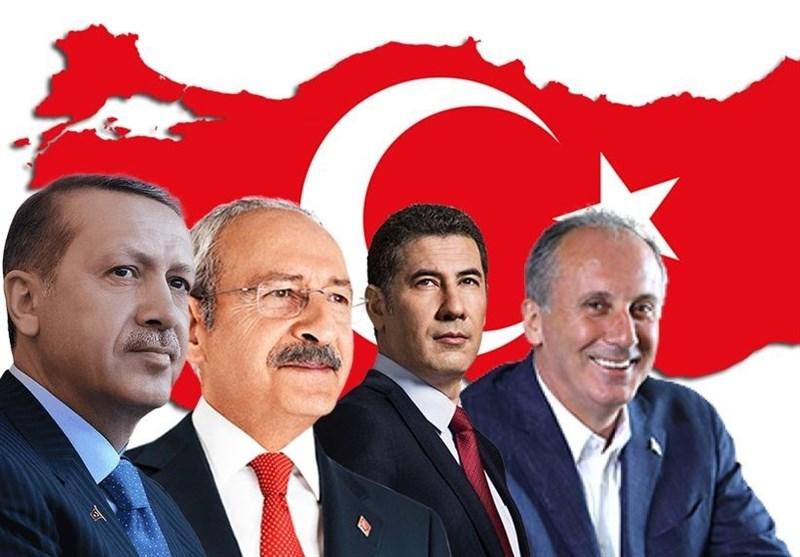Kemal Gulicdaroglu, Chairman of the Republican People’s Party, Ali Babajan, Chairman of the Democracy and Progress Party, Ahmet Davutoglu, Chairman of the Future Party; Gultkin Oysal, Chairman of the Democracy Party; and Temel Karamolaoglu are five parties that have nominated Kemal Kılıdaroğlu as their only candidate. In the meantime, the People’s Democratic Party (Kurds) and Salaheddin Demirtaş, the former leader and imprisoned member of this party as a Kurdish politician under the orders of the PKK, have shown in different ways that they want the victory of Kılıçdaroğlu.
In recent weeks, the results of the Turkiye poll have also been very different. The ruling “Justice and Development” party and the “People’s Republic” party consider themselves the winners of this election. Fluctuations in the amount of party votes have increased. The average of 9 election polls indicates a 4.5 percent difference between the votes of Klichdaroglu and Erdogan, and the election will be extended to the second round. In these polls about the second round of presidential elections in which Erdogan and Kılıçdaroğlu are said to be competing, 50.3% of the participants vote for Kılıçdaroğlu and 49.7% for Erdogan. If one of these candidates does not win, the re-election will be held on June 28.
Klichdaroglu, the leader of the People’s Republic Party, has promised to separate domestic politics from foreign politics. From now on, ideological approaches and calculations of domestic politics will no longer be foreign policy factors. In foreign policy, he promises a flourishing, democratic Turkey and is ready to join the European Union. Therefore, this country will be subject to the European Court of Human Rights decisions. Turkey can once again be democratic, prosperous, ready to pursue membership in the European Union, and better aligned with its allies in NATO.
The Turkish opposition claims to return the purchased S-400s to Russia and the program of buying F-35 fighters from the United States. The Turkish government planned to buy 100 F-35 fighter jets from the US, and Ankara was part of the international consortium to build this fighter; However, Turkey’s decision to purchase the S-400 air defense system from Russia caused Washington to cancel the contract of sale and cooperation with Turkey in the production of fighters.
One factor that makes Turkey’s membership in the European Union difficult is Turkey’s continued support for the “Turkish Republic of Cyprus.” This can complicate relations between Ankara and Brussels because Cyprus is a member of the European Union.
To impose a new understanding of Turkish politics, Kılıçdaroğlu has decided to create a Middle East peace and cooperation organization consisting of Turkey, Iran, Iraq, and Syria. Regarding the support of Palestine, Klichdaroglu believes, “If we are going to stand by the truth and justice, we should certainly be by the side of Palestine.” Otherwise, we will reject the faith and beliefs taught to us. We will not remain silent in the face of oppression. If there is oppression somewhere, we will stand against it. We must work together for peace in the Islamic world. We have a goal for the Middle East. “There is much wealth underground in this region, but this wealth can turn into a disaster for countries.”
He also promised to normalize Turkey’s relations with Syrian President Bashar al-Assad. Of course, Erdogan has also taken steps in this direction. In this regard, it is not strange if Kılıçdaroğlu chooses Damascus as the destination of his first trip the day after winning the elections.
He has taken strong positions on the issue of illegal immigration and the entry of thousands of refugees into this country. Recently, after the influx of illicit Afghan immigrants to Turkey, he told the Turkish border guards: “The homeland is the homeland of all of us, and the borders are the honor of all of us. Do your duty at the border, and don’t listen to anyone. They will open the border of Iran, and we will return the Afghans who came to Turkey to Iran. I want Syria, Iran, and Afghanistan to know this. We do not want the demographic structure of our country to change. “We will return our Syrian brothers and sisters to their country within two years at most.”
In the domestic arena, he is supposed to prepare for a referendum as soon as he wins the upcoming elections. Turkey will be returned to the parliamentary system once again, and the country will be governed by the prime minister and under the supervision of the parliament.
Among the essential points of Kılıçdaroğlu’s internal views were his positions regarding the Kurds of this country and his meeting with two equal leaders of the People’s Democratic Party. In this meeting, he gave the text of the constitutional amendment and the text of the joint agreement prepared by the People’s Democratic Party to the leaders of the People’s Democratic Party. He said, “The judicial system must be independent and impartial, and the law-abiding government must be at work in Turkey.”
These words met with Erdogan’s reaction. He claimed not long ago that “If you want Salaheddin Demirtaş (former leader of the People’s Democratic Party) and Osman Kavala (a figure in Turkish civil society) to be released from prison, you should vote for me.” In Klichdaroglu’s campaign, the slogan “Let’s open the red flag, let the age of tyrants end” is used. In addition to the Communist Party of Turkiye, the THKP-C group also uses this slogan and asks its fans to support Kılıçdaroğlu’s candidacy for the presidency.
“Alliance of the Nation” has not presented a clear position on other vital issues of Turkiye. The coalition promises to strengthen freedom of speech and opinion, but this claim is vague. Klichdaroglu has not yet taken a clear position regarding the purge of academic figures, lawyers, journalists, and others accused of terrorism and imprisoned by the Justice and Development Party since 2016.










0 Comments